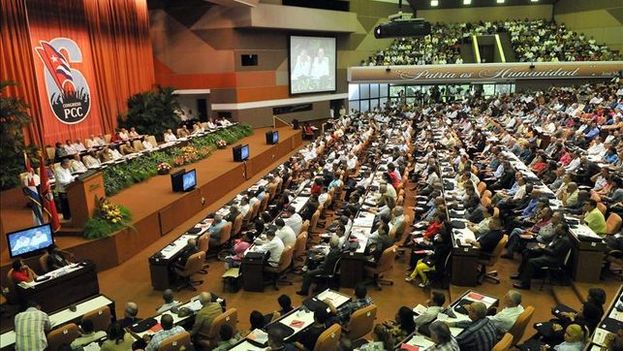
![]() 14ymedio, Reinaldo Escobar, Havana, 12 April 2016 — Ruperto, the comedic character in Vivir del Cuento (Living the Story), woke up after a 28-year coma and still doesn’t understand Cuba’s dual currency system nor the end of the Socialist Camp. In this case, there are many “Rupertos” who will analyze the upcoming Seventh Congress of the Cuban Communist Party, who believe that everything will continue as before and the hardliners will have their way. For them, nothing has happened in the last decade since Fidel Castro left power and passed it on to his younger brother.
14ymedio, Reinaldo Escobar, Havana, 12 April 2016 — Ruperto, the comedic character in Vivir del Cuento (Living the Story), woke up after a 28-year coma and still doesn’t understand Cuba’s dual currency system nor the end of the Socialist Camp. In this case, there are many “Rupertos” who will analyze the upcoming Seventh Congress of the Cuban Communist Party, who believe that everything will continue as before and the hardliners will have their way. For them, nothing has happened in the last decade since Fidel Castro left power and passed it on to his younger brother.
If, in fact, nothing happened, the great event of the Cuban communists would be a remake of previous congresses. Those who have not been in a coma since 2006 have seen that that axes around which Cuban politics revolve are not the same. The rampant reversal of paternalism, the preponderance of economics over ideology in decision-making, the failure of the monopoly on the media and culture, and a long list of reforms – classified by some as timid and by others as devious – paint an entirely different picture. To this should be added the change in the correlation of influences in the international arena and a growing and increasingly evident popular discontent.
Most of the delegates to this Congress have no memory of the first of January 1959 when “luminously dawned the morning,” as the poet Indio Nabori wrote. For the first time, when a new Central Committee, and especially a new Politburo are chosen, most of their members will have no responsibility for the executions of those first years and probably never even shouted the slogan “Paredón! Paredón!” – “To the [execution] wall!” None of them seized any properties. Those born after 1960 weren’t even old enough to vote when the first constitution was approved in 1976.
These delegates are no longer homophobic atheists who boasted of their machismo and the fact that they never passed the 9th grade because they were of humble origin. They have been politically shaped with an awareness that the system is not invulnerable and that the theory behind it is debatable. They have connected to the internet, studied marketing techniques and, although it seems a frivolity, passed a decade without listening to the speeches of Fidel Castro; and they did listen to Barack Obama’s remarks in Havana’s Gran Teatro.
And so this Party meeting cannot be more of the same.
However, this does not mean that General Antonio Maceo (b. 1845) is going to sit down to talk with General Martinez Campos (b. 1831), nor that the name “communist” will be removed from the Party. The hard core will impose its authority by dint of intimidation against the unruly and through the offering of perks and opportunities. It is also true that most of the delegates to this Congress should have participated at more than one repudiation rally, and it is probably that many have betrayed a co-worker or a neighbor, and that most of the time in the assemblies in which they have participated in they have dutifully raised their hands for what in the opinion of the nomenklatura is politically correct.
There will be no surprising news such as opening the door to a multi-party system, or launching a program of privatizations. No one will talk at this event about reconciliation among Cubans or dialog with opponents. There will be no decree of amnesty for political prisoners, nor recognition of the legitimacy of an alternative civil society, of freedom of expression or of an independent press.
However, those who rule Cuba know that they are forced to change something or at least to give the impression that they are willing to do so. They have their hole cards, but they should put them on the table. The secrecy with which they have managed the documents to be discussed can only indicate that they are preparing to change direction and we will have to wait for the closing remarks to see the course taken.
Because what has really characterized the Cuban Communist Party is not having its own theoretical base and, above all, not respecting the letter of its own agreements. Decisions made in a personal and specious manner by one or two people have always prevailed. And it is precisely this that would be the unpredictable essence of change. Will they recognize Marxism-Leninism as only a secondary source to be taken into account? In the hidden desires that fill the heads of these real men and women is the key to what to expect of the Seventh Congress.
